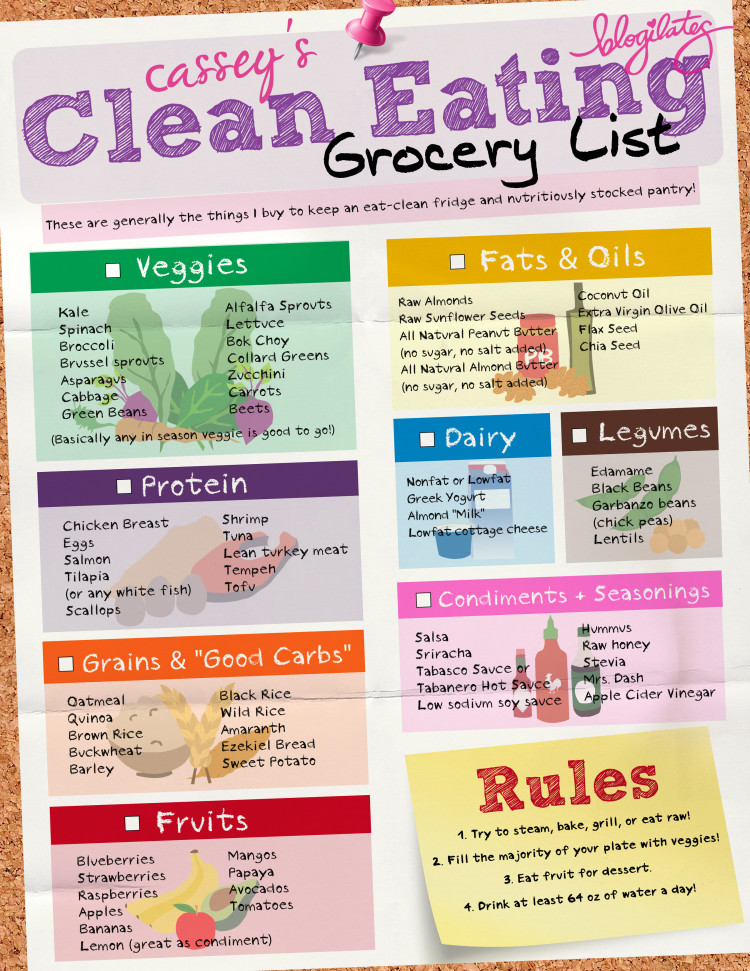Shopping at the grocery store can be stressful and confusing. Follow our quick go to stocking your fridge and pantry with foods to keep you fit and healthy!
Below are the important food groups you need on your plate and why you need them.
Veggies
- Eating a diet rich in vegetables and fruits as part of an overall healthy diet may reduce risk for heart disease, including heart attack and stroke.
- Eating a diet rich in some vegetables and fruits as part of an overall healthy diet may protect against certain types of cancers.
- Diets rich in foods containing fiber, such as some vegetables and fruits, may reduce the risk of heart disease, obesity, and type 2 diabetes.
- Eating vegetables and fruits rich in potassium as part of an overall healthy diet may lower blood pressure, and may also reduce the risk of developing kidney stones and help to decrease bone loss.
- Eating foods such as vegetables that are lower in calories per cup instead of some other higher-calorie food may be useful in helping to lower calorie intake.
Fruits
- Eating a diet rich in vegetables and fruits as part of an overall healthy diet may reduce risk for heart disease, including heart attack and stroke.
- Eating a diet rich in some vegetables and fruits as part of an overall healthy diet may protect against certain types of cancers.
- Diets rich in foods containing fiber, such as some vegetables and fruits, may reduce the risk of heart disease, obesity, and type 2 diabetes.
- Eating vegetables and fruits rich in potassium as part of an overall healthy diet may lower blood pressure, and may also reduce the risk of developing kidney stones and help to decrease bone loss.
- Eating foods such as fruits that are lower in calories per cup instead of some other higher-calorie food may be useful in helping to lower calorie intake.
Dairy
- Intake of dairy products is linked to improved bone health, and may reduce the risk of osteoporosis.
- The intake of dairy products is especially important to bone health during childhood and adolescence, when bone mass is being built.
- Intake of dairy products is also associated with a reduced risk of cardiovascular disease and type 2 diabetes, and with lower blood pressure in adults.
Fats
- Most of the fats you eat should be polyunsaturated (PUFA) or monounsaturated (MUFA) fats(like coconut oil). Oils are the major source of MUFAs and PUFAs in the diet. PUFAs contain some fatty acids that are necessary for health – called “essential fatty acids.”
- The MUFAs and PUFAs found in fish, nuts, and vegetable oils do not raise LDL (“bad”) cholesterol levels in the blood. In addition to the essential fatty acids they contain, oils are the major source of vitamin E in typical American diets.
Proteins
- Meat, poultry, fish, dry beans and peas, eggs, nuts, and seeds supply many nutrients. These include protein, B vitamins (niacin, thiamin, riboflavin, and B6), vitamin E, iron, zinc, and magnesium.
- Proteins function as building blocks for bones, muscles, cartilage, skin, and blood. They are also building blocks for enzymes, hormones, and vitamins. Proteins are one of three nutrients that provide calories (the others are fat and carbohydrates).
- B vitamins found in this food group serve a variety of functions in the body. They help the body release energy, play a vital role in the function of the nervous system, aid in the formation of red blood cells, and help build tissues.
- Iron is used to carry oxygen in the blood. Many teenage girls and women in their child-bearing years have iron-deficiency anemia. They should eat foods high in heme-iron (meats) or eat other non-heme iron containing foods along with a food rich in vitamin C, which can improve absorption of non-heme iron.
- Magnesium is used in building bones and in releasing energy from muscles.
- Zinc is necessary for biochemical reactions and helps the immune system function properly.
- EPA and DHA are omega-3 fatty acids found in varying amounts in seafood. Eating 8 ounces per week of seafood may help reduce the risk for heart disease.
Grains
- Consuming whole grains as part of a healthy diet may reduce the risk of heart disease.
- Consuming foods containing fiber, such as whole grains, as part of a healthy diet, may reduce constipation.
- Eating whole grains may help with weight management.
- Eating grain products fortified with folate before and during pregnancy helps prevent neural tube defects during fetal development.

Visit Blogilates for the original grocery list and USDA.gov fore more information on food groups


![Just For The Health Of It! [VIDEO]](http://FitPhreak.com/wp-content/uploads/2016/03/Just_for_the_Health_of_it-223x145.jpg)









![Tools To Help You Shape Up [VIDEO]](http://FitPhreak.com/wp-content/uploads/2016/03/2016-02-15_0602-223x145.jpg)
